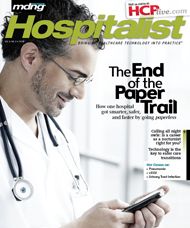Publication
Article
Nocturnists: The Night Owls of the Medical World
Author(s):
As hospital medicine continues to evolve and grow as a specialty, hospitalist groups are looking to branch out and provide more services.
What are the advantages of having dedicated nocturnists instead of rotating doctors?
As hospital medicine continues to evolve and grow as a specialty, hospitalist groups are looking to branch out and provide more services. A variety of factors are prompting hospitals to expand coverage to provide 24/7 hospitalist care, leading to the creation of a new sub-specialty: the nocturnist. Although many programs, in an effort to recruit nocturnists, promise shorter hours, more fl exible scheduling, and better pay, the lifestyle adjustment nighttime coverage requires is not for everyone. To fi nd out more about the pros and cons of choosing this career path and lifestyle, MDNG spoke with Ravi Santhanam, MD, an IPC hospitalist who practices as a nocturnist at Methodist Hospital in San Antonio, TX. Dr. Santhanam currently serves on the hospital’s Medical Executive Committee and Medical Records Committee.
Well, for one thing, it keeps the daytime doctors refreshed, so they can have a better night’s sleep. It’s more of a regular work schedule, so they can focus better on their daytime duties, and at night, they can take care of the admissions and the emergencies at night, which is what they are meant to do.
Have you seen any statistics or studies that show improvements to patient care when nocturnists are hired in a hospital setting?
I don’t think we can connect any studies that have been done, right off the top of my head, because it’s a new thing, a new concept.
What would you say are the benefi ts to being a nocturnist? Is there a downside to working as a nocturnist?
Well, the biggest benefit is obviously more free time, because most nocturnists get a week on, and then a week off, which gives you enough time to catch up with your family and personal life, and most nocturnist jobs are two weeks a month. Another benefi t to being a nocturnist is that they usually receive a higher base pay than regular hospitalists, and they get the whole benefi ts [package]. Sometimes they have a bonus package, but it depends on how many patients they see.
Obviously, the detriment is that you’re working against the body clock, because you have to get used to the shift work. Another drawback is that you don’t get to follow the patients during the day. Sometimes, you’d like to know a little more about what’s happening with them. You work with them, and you take care of them, and then another person comes in and takes over in the morning.
Is it difficult to find and recruit doctors who are willing to take on this role?
It has been a bit hard, because most people are not familiar with the concept of a nocturnist, but I think once they’ve done it for a cycle, some doctors find it easier than the daytime shift.
What do you like best about the nocturnist position, and are there any things that you particularly don’t like about the idea?
Generally, if you’re a nocturnist, you can become less involved in the hospital’s activities, such as meetings and committees, and you don’t want to let that happen. At night, it’s just you and the patient and maybe one or two relatives over the course of the night. It’s pure medicine. You do a lot of procedures, you can handle emergencies, but mostly you’re really on your own.
Is that the most challenging part of the job?
Yes. if you’re the only doctor in the hospital that night, if something happens, you’re the fi rst point of call. You will be responsible for making sure all of the patients in the hospital are taken care of. I think it’s a lot more hands-on medicine, and obviously there are a lot of other concerns, because at night, it’s pretty much you. For the right hospitalist who is familiar with doing procedures and doesn’t mind being on his or her own, it’s a good job to start with, if you want to be right in the center of the action.
But Do Nocturnists Improve Care?
To date, there is very little evidence in the literature showing that round-the-clock hospitalist coverage using nocturnists produces better outcomes than programs that rely on on-call physicians. An article in a 2008 issue of the Hospitalist Management Advisor newsletter quoted Kenneth Epstein, MD, MBA, director of medical affairs and clinical research at IPC The Hospitalist Company, Inc, as saying there is little difference between these two approaches in terms of outcomes. According to the newsletter, Epstein studied more than 80 IPC hospitalist programs (programs that provided 24/7 coverage and those that used on-call physicians) and compared them across an array of quality outcomes (length of stay, readmission, mortality, etc), fi nding “no measurable advantage to 24/7 programs.” These fi ndings were originally presented in an abstract at the 2007 Society of Hospital Medicine annual conference. The newsletter noted that Epstein is “currently concluding his research in a retrospective analysis article to be published in 2009.”
A Day (or Night) in the Life of a Nocturnist …Ahh, I get to carry the [general internal medicine] pager. I wonder how many pages I am going to get tonight asking if I cover [General Internal Medicine Triage Offi cer] patients. Do they not realize those two little letters mean so much? (buzz buzz buzz) The fi rst barrage of pages, and of course all the teams have signed out by 5:15pm. This patient is agitated, in restraints, and no haldol prn? The patient got switched to percocet at 3:00pm and already wants their dilaudid? A family meeting now? (buzz) First admission from the Emergency Department (ED). Nice to see they are cleaning house. Time to go to the ED. (buzz buzz) Do I know if the patient will go home tomorrow? Maybe, though I will not decide. Yes, the patient can have an extra dose of dilaudid and benadryl. Why is she not on a patientcontrolled analgesia (PCA) pump? Need to transfer her to GIM 3. Well, done admitting that 90 year old for altered mental status and a history of metastatic pancreatic cancer on tube feeds and severe dementia. The only person I could contact was her granddaughter who fi rmly believes the patient would want everything done... ok… I’ve got some time to review cross-coverage sign out. Let’s see only 7 subspecialties notes to review, 6 BMPs, 5 chest… x… rays. 4 hemoglobins, 3 cardiac enzymes, 2 line placements, and a restraint order to be signed at 4:00am. (Using the tune from the Twelve Days of Christmas) (buzz) You called an AMET on chest pain? Are the vitals stable… yes? Ok, I guess. I will be right there. Stat EKG, enzymes, CXR, and nitro. The patient is fi ne after the nitro? Let us see how the enzymes turn out… The midnight hour approaches. 2 hours later, oh there are the stat cardiac enzymes which are negative. Should I go to the call room now, or wait for my next admission? Admitting and Kaiser still are waiting. (buzz) Am I Orange? Not since last year. Also, why does the GIM pager always get paged when Orange is asked for? No, I do not cover Kaiser. No, I do not distribute admissions, call the GIMTO. Let us see, it is 1:30am. I wonder if I will get 3 hours of sleep. (buzz) Another patient who can not sleep? Why do they not put ambien in the water? (sleep… buzz) Yes, did someone page GIM? General Internal Medicine? (hold) No one paged me? Ok… did anyone page anyone? Yes… yes, you can give an extra dose of dilaudid…
-- Excerpted from the blog Just What the Doctor(s) Ordered
Want to read more about the role of the nocturnist? Check out these resources for more information:
- How to Find and Keep Dedicated Nocturnists www.the-hospitalist.org/details/article/188669/Duty_after_Dark.html
- Physicians of the Night: The Who, What, and Why of Nocturnists www.acphospitalist.org/archives/2008/12/cover.htm
- Hospitals Move to Reduce the Risk of Night Shift http://online.wsj.com/article/SB121193074899024387.html






